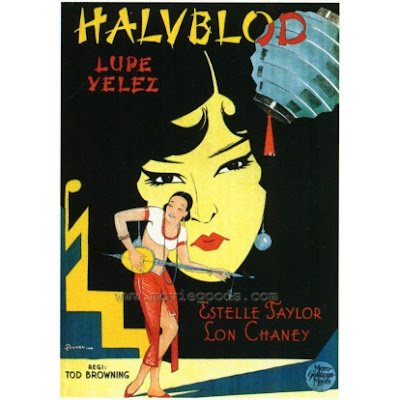
"The first time you buy a house you think how pretty it is and sign the check. The second time you look to see if the basement has termites. It`s the same with men." Lupe Vélez (1908-1944)

Yes, this blogger knows she's remembered - and erroneously - for her place in the Ignominous Showbiz Deaths pantheon, instead of her legacy as kick-ass comedienne, actress, singer and big screen presence: the one and only Lupe Vélez.
In a new biography, Lupe Vélez: The Life And Career Of Hollywood's Mexican Spitfire, Australian author, prolific blogger and film historian Michelle Vogel has delved into - and debunked - various urban legends surrounding the fiesty, hard-partying actress who conquered Hollywood movies and took no prisoners at any point along the way.
As those who attended the San Francisco Silent Film Festival a few years back well know, Ms. Vélez first made a name for herself in silent movies. Here she is, tango-ing up a storm with swashbuckling Doug Fairbanks in The Gaucho, a box office hit so popular that it would soon be lampooned by a Mickey Mouse cartoon.
Lupe followed that success up by co-starring with Lon Chaney, Sr. in Where East Is East, heretofore a lost film.
She also sang in one of D.W. Griffith's last silver screen hurrahs, the 1929 "part-talkie" Lady Of The Pavements. Only silent prints exist of the Griffith film, but at least Lupe's rendition of Irving Berlin's Where Is The Song Of Songs For Me, recorded in March 1929, can still be heard.
RKO Radio Pictures, no doubt in search of the next big thing and the first Latina movie star, signed Lupe and diva Dolores Del Rio. This directly led to Lupe co-starring with fast talkin' wiseacre and pre-Code icon Lee Tracy in what could be considered the first "screwball comedy", director Gregory LaCava's snappy and repartee-packed The Half Naked Truth.

On loan-out to MGM, Lupe would appear among the cast of thousands in the 1934 review film Hollywood Party.
Arguably, her best known scene in the film is the following sketch with Laurel & Hardy, with whom Lupe made one of her first film appearances in 1927.
While the enforcement of the hated Production Code, beginning in July 1934, did not help her career any more than it did Mae West's, Lupe kept on making films and eventually shared the spotlight with RKO's own randy and cheerfully lecherous pre-Code comedy stars, the team of Bert Wheeler & Robert Woolsey. One wonders if she was added to the cast of High Flyers due to Woolsey's failing health at the time.

Although there were serious doubts as to whether he could complete the picture, Robert and Lupe collaborate splendidly on the following "I'm A Gaucho" number. It turned out to be the last scene Robert Woolsey - a trouper to the end - ever filmed.
Lupe's impersonations in the same film are a riot, arguably only equalled by a screen comedienne by Marion Davies in The Patsy.
Perhaps noting how well she worked with Bert and Bob, the studio cast Lupe in The Girl From Mexico, an unassuming B-movie co-starring Ziegfeld Follies comedian Leon Errol. Its success launched what would become the Mexican Spitfire series, a fine showcase for the co-stars' considerable comedy chops - and a cash cow for RKO.
These films, in this blogger's estimation, get a bad rap today primarily because they are B-films with a politically incorrect series title.
On Level 1, the character she plays, Carmelita Fuentes, could be seen strictly as a Latina stereotype and example of racism in pre-WW2 Hollywood. On Levels 3 and beyond, it becomes apparent that Lupe is subverting those stereotypes every step of the way, while getting laughs in the process.
Lupe and Leon bring a certain gusto, fun and outrageousness to the eight films in the series. When they improvise scenes together, bringing spontaneity to what were undoubtedly tight shooting schedules, the results are glorious.
In life and in the decades since her suicide in 1944, Lupe Vélez deserved better. Hopefully, Ms. Vogel's book will dispel at least some of the many myths about her life and redirect the spotlight where it belongs, on her groundbreaking stage and screen career.
I personally think Lupe would have been great in Mel Brooks movies.



2 comments:
Thanks for the great post and plug for my book, Paul. Much appreciated. I agree, Lupe teaming up with Mel Brooks would have been perfect :)
Just wanted to let everyone know that I'm offering FREE signed bookplates for anyone purchasing my Lupe Velez book. Proof of purchase required.
More details at my blog: http://mvozus.wordpress.com/
Post a Comment